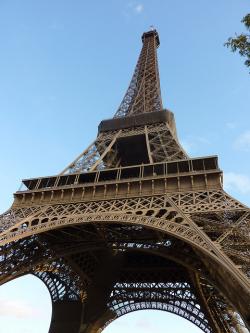
The Eiffel Tower was built for the International Exhibition of Paris of 1889 commemorating the centenary of the French Revolution. Of the 700 proposals submitted in a design competition, Gustave Eiffel's was unanimously chosen. At 300 meters and 7,000 tons, it was the world's tallest building until 1930.
The elevators ascend and descend within the curved legs of the tower, starting at an angle of 54 degrees from horizontal at the base and leveling out to 78 degrees at the top. The elevator cars are built with seatbacks that rotate to adjust to the varying angle.
A total of 18,038 individual pieces of cast iron were used to build the Eiffel Tower. Elements were bolted together in roughly 5-foot lengths at Eiffel's fabrication shop and then transported to the site. There, the bolts were removed and the segments permanently riveted together, using a total of 2,500,000 rivets.



- Gustav Eiffel, February 14, 1887